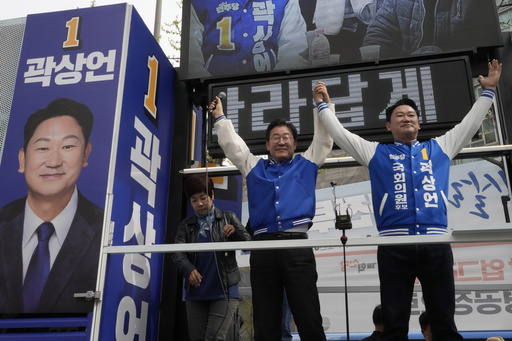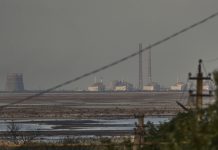SEOUL, South Korea (AP) — Soaring green onion prices. Striking doctors. A politician’s allegedly sexist jab at a female candidate.
These are among the issues animating voters in South Korea as they go the polls on Wednesday to elect a new 300-member parliament. Many are choosing public livelihoods and other domestic concerns as the most important election issues, staying away from traditional topics such as North Korean nuclear threats and U.S. security commitment for South Korea.
“I feel drawn to someone who talks about things that can be truly helpful to our neighborhoods,” said Kim Yun-ah, a 45-year-old Seoul officer worker. “I often don’t know when North Korea test-fired missiles.”
Experts say up to 30% to 40% of South Korea’s 44 million voters are politically neutral and their choices could determine election results.
Here’s a look at some of the burning issues in the elections:
CANMODERATES SWAY THE VOTE?
South Korea’s conservative-liberal divide is so stark that many likely have already determined who they’ll vote for according to their party affiliation, rather than by looking at candidates’ policies in their districts.
But the extreme polarization also has led to a growing number of moderates who are fed up with partisan strife and focus more on issues directly affecting them such as prices, jobs and taxes, according to Choi Jin, director of the Seoul-based Institute of Presidential Leadership.
Choi estimated that roughly 30% of South Koreans consider themselves conservatives, another 30% liberals and the remaining 40% moderates. Other experts put the proportion of moderates at 30%.
“In a nutshell, even if conservatives and liberals intensely bicker over political issues, that won’t influence election results much,” Choi said. “The fate of an election is rather determined by the moderates who silently monitor livelihood issues and decide who to vote for.”
Some observers say liberal parties could retain their parliamentary majority, making conservative President Yoon Suk Yeol — whose single five-year term ends in 2027 — an early lame duck. But others note many moderates are still undecided.
Regardless of the outcome, Yoon’s major foreign policy agendas would remain unchanged, such as boosting security cooperation with the U.S. and Japan and taking a tough line on North Korea’s nuclear program, experts say.
WHAT’S THE DEAL WITH GREEN ONIONS?
Yoon got more than he bargained for when he visited a Seoul grocery mall last month to promote government efforts to tame food prices but ended up inviting criticism by talking about the price of green onions.
Looking at a bundle of green onions with a price tag of 875 won ($0.65) — a temporary discount price thanks to a government subsidy — Yoon said, “I’ve been to lots of markets, and I would say 875 won is a reasonable price.”
Meanwhile, the average retail price of green onions has hovered around 3,000 won to 4,000 won ($2.2 to $2.9), some of the highest in recent years.
Yoon’s throw-away comment created a mini-crisis for his ruling People Power Party as candidates from the main liberal opposition Democratic Party brought green onions to election rallies and accused Yoon of underestimating food prices and being out of touch with reality.
It’s not just green onions. Prices of agricultural products in March increased by more than 20% from the same month last year. The price of apples increased by nearly 90%, marking the largest one-year-jump since 1980.
Kim Tae-hyung, 55, said he’s almost decided to vote for a liberal opposition candidate in his constituency because he believes the Yoon government hasn’t done well on the economy.
But he said Yoon doesn’t deserve criticism over his green onion remarks. “Even if he doesn’t know the price of green onions, I don’t think it matters much as I also didn’t know about it.”
ARE DOCTORS’ STRIKES HURTING THE RULING PARTY?
The weekslong strikes by thousands of doctors is another headache for Yoon’s party.
The doctors, all medical interns and residents, are protesting against Yoon’s push to increase the yearly medical school admission cap by two thirds. They say universities can’t handle such a steep increase in students and that it would undermine the country’s medical services. Critics say doctors worry about their income if there are more of them.
Yoon’s plan initially gave him a boost in approval ratings but he now faces growing calls for a compromise as the strikes have caused numerous cancellations in surgeries and other inconveniences for patients.
TOXIC RHETORIC
Fueled by contempt for the other side, the rival parties have spewed highly offensive, abusive language at each other.
When Lee Jae-myung, the Democratic Party chairman, criticized senior ruling party candidate Na Kyung-won over her alleged pro-Japanese views, he called her “nabe,” a combination of letters of her name and that of late Japanese Prime Minister Shinzo Abe.
Ruling party leader Han Dong-hoon called Lee’s comments “extreme misogyny.” Nabe in Japanese means pot, whose Korean translation is “naembi,” which can be used as a derogatory slang term to refer to a woman with many sex partners. Last month, supporters of Na’s liberal rival candidate reportedly spread on social media a poster with a message saying “naembi tastes best when it’s trampled on.”
Han labelled Lee’s past comments as “trash,” drawing rebukes from Lee’s party spokesperson, who described “Han’s mouth” as “trash bin.”
Also roiling the South Korean election race is former liberal justice minister Cho Kuk, whose newly launched small party is forecast by surveys to win 10-15 seats. Cho was once a rising political star during the government of Yoon’s liberal predecessor, Moon Jae-in, until he faced a slew of scandals that hurt his reformist image and sharply split the nation.
Han called Cho “a shameless petty criminal.” Cho said Han, Yoon and Yoon’s wife and first lady Kim Keon Hee were “representative people of a criminal group.”
Source: post





